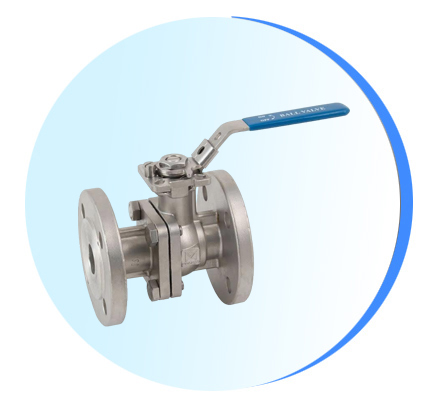
Pawar Industries is leading Manufacturers in Two-piece Chloride Ball Valves
Two-piece chloride ball valves are essential components used in industrial applications where resistance to corrosive fluids is critical. These valves are specifically designed to handle aggressive media containing chloride compounds, offering excellent corrosion resistance and reliable performance. In this comprehensive guide, we will explore the working principles, advantages, applications, and maintenance considerations of two-piece chloride ball valves. Whether you are an engineer, technician, or someone interested in fluid control systems, this article will provide valuable insights into the functionality and benefits of two-piece chloride ball valves.
Working Principles of Two-Piece Chloride Ball Valves -
Two-piece chloride ball valves operate based on the principle of a rotating ball with a bore in the center that controls the flow of corrosive fluids. These valves consist of two main components: a valve body and a ball with a bore.
When the valve is in the open position, the ball is rotated by the actuator, aligning the bore with the flow path and allowing the corrosive fluid to pass through. When the valve is closed, the ball is rotated to block the flow path, providing a secure shut-off and preventing any leakage.
Two-piece chloride ball valves offer advantages such as excellent corrosion resistance, minimal maintenance, and reliable performance. They are suitable for applications that involve corrosive fluids containing chloride compounds, such as chemical processing, petrochemicals, water treatment, and offshore industries.
Advantages of Two-Piece Chloride Ball Valves -
Two-piece chloride ball valves offer numerous advantages, making them a preferred choice in industrial applications where corrosion resistance is essential. Some key advantages include:
a) Corrosion Resistance : Two-piece chloride ball valves are specifically designed with materials that exhibit excellent resistance to corrosion caused by chloride-containing fluids. This prevents degradation, ensures long-term performance, and minimizes the risk of leaks or failures.
b) Versatility : These valves are versatile and can handle a wide range of corrosive fluids containing chloride compounds. They are suitable for various industries, including chemical processing, petrochemicals, water treatment, and offshore applications.
c) Minimal Maintenance : Two-piece chloride ball valves require minimal maintenance due to their robust construction and corrosion-resistant materials. They are designed to withstand harsh operating conditions, reducing the need for frequent repairs or replacements.
d) Reliable Performance : These valves offer reliable performance, providing secure shut-off and precise flow control even in corrosive environments. Their sturdy construction and high-quality materials ensure consistent operation and longevity.
e) Ease of Installation : Two-piece chloride ball valves are designed for easy installation, allowing for efficient integration into existing systems. Their standardized dimensions and compatible end connections simplify the installation process, reducing downtime and associated costs.
Applications of Two-Piece Chloride Ball Valves -
Two-piece chloride ball valves find applications in various industries where corrosion resistance is critical. Some common applications include:
a) Chemical Processing : Two-piece chloride ball valves are extensively used in chemical processing plants where corrosive fluids containing chloride compounds are handled. They provide reliable flow control, secure shut-off, and resistance to chemical attack, ensuring safe and efficient processing operations.
b) Petrochemical Industry : These valves play a crucial role in the petrochemical industry for controlling the flow of corrosive fluids, including hydrocarbons and chemicals. They offer reliable performance, corrosion resistance, and durability in demanding environments.
c) Water Treatment : Two-piece chloride ball valves are utilized in water treatment plants, especially in applications involving seawater or brine, where chloride content is high. They ensure reliable flow control, prevent corrosion, and maintain system efficiency in desalination, filtration, or chemical dosing processes.
d) Offshore Industry : These valves find applications inoffshore industries, including oil and gas exploration and production, where exposure to seawater and corrosive environments is prevalent. Two-piece chloride ball valves provide reliable flow control, corrosion resistance, and long-term performance in offshore platforms, subsea installations, and marine applications.
e) Mining and Metal Processing : Two-piece chloride ball valves are employed in mining and metal processing operations where corrosive fluids, such as acidic solutions or chloride-containing solutions, are present. They ensure precise flow control, prevent corrosion of equipment, and contribute to efficient processing and product quality.
Maintenance Considerations for Two-Piece Chloride Ball Valves -
Proper maintenance of two-piece chloride ball valves is essential to ensure their optimal performance and longevity. Here are some important maintenance considerations:
a) Regular Inspection : Conduct routine inspections to check for signs of corrosion, erosion, or damage to the valve body, ball, seals, and other components. Replace any worn or damaged parts promptly to maintain efficient operation and prevent leakage.
b) Corrosion Protection : Apply appropriate corrosion protection measures, such as coatings or linings, to vulnerable areas of the valve exposed to corrosive fluids. This helps enhance the valve's resistance to corrosion and extends its lifespan.
c) Cleaning and Flushing : Regularly clean the valve internals and flush the system to remove any accumulated deposits, debris, or contaminants. This helps maintain optimal performance, prevent blockages, and ensure proper sealing.
d) Lubrication : Ensure proper lubrication of the valve stem, ball, and seals as recommended by the manufacturer. Lubrication helps reduce friction, ensures smooth operation, and extends the valve's lifespan.
e) Training and Documentation : Ensure that personnel responsible for maintaining two-piece chloride ball valves receive proper training on maintenance procedures and safety protocols. Keep detailed records of maintenance activities, including inspection dates, cleaning, lubrication, corrosion protection measures, and replacements, to track the performance history of the valve.


